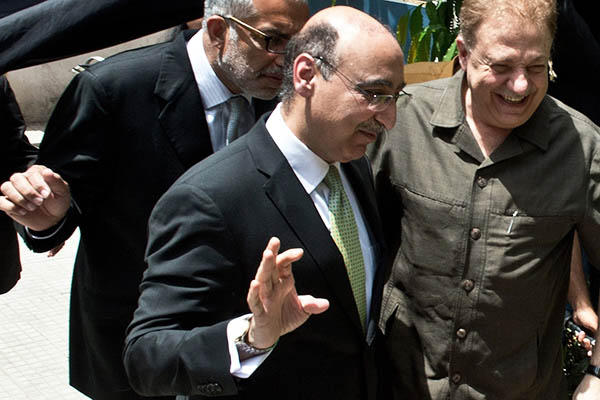
File Photo. Prakash Singh—AFP
Pakistan and India’s ongoing media war fosters confusion and bitterness.
Much confusion was created on news channels on Thursday when Abdul Basit, Pakistan’s high commissioner in India, was reported as telling the Foreign Correspondents Club in New Delhi that he thought “at present the peace process between India and Pakistan is suspended.”
This was taken by the Indian press to mean that the Pathankot attack had closed the door on any dialogue between the countries. Basit was more likely referring to the Composite Dialogue, which began in 1985 and has been disrupted countless times since. Similarly, his “hint” that Pakistan’s Joint Investigation Team for Pathankot “aimed at finding the truth, and reciprocity was not its main objective” was taken to mean that Pakistan would not allow an Indian investigation team to travel to Pakistan.
An official statement released later by the Pakistan High Commission contained nothing of the above. The Indian media used the message inferred from Basit’s rather tough-sounding reference to “foreign agents” arrested in Pakistan to set the political pot boiling. Basit’s “blunt comments” have supposedly riled the Indian opposition already unhappy with Prime Minister Narendra Modi for his alleged appeasement of Pakistan, especially after his unscheduled visit to Prime Minister Nawaz Sharif’s house in Lahore in December.
Basit had repeated Pakistan’s firm stand on Kashmir and Pakistan’s “national consensus” on making Kashmir the lynchpin of any peace process with India. But his statement came just days after a new coalition government had been installed in Srinagar amid local protests featuring young Kashmiris holding aloft Pakistani flags. The Pakistani media didn’t help either by alleging that the Pakistani investigation team for Pathankot was treated in an offhand manner by the Indians and was not shown the evidence it needed to examine. The icing on the cake was a concocted statement from our investigation team that India had “staged” Pathankot.
The takeaway from the above confusion is that the recent Pakistan-India thaw is off and another period of mutual threats has begun. And this has happened when the stage was being set for Modi’s visit to Pakistan this November for the 19th SAARC summit. In its current state of extreme isolation, it is not in Pakistan’s interest to take on India. Pakistan’s relations with its regional neighbors (India, Afghanistan, and Bangladesh) are strained. Add to that a rather ham-handed handling of the Yadav affair vis-à-vis Iran and you have added another important state to the list of the offended. Some soft-pedaling of the Yadav media campaign may be in order to calm nerves all around.
